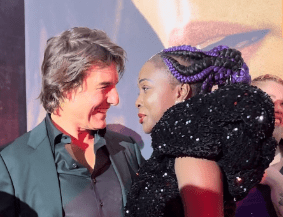In the midst of debates surrounding the upcoming Paris Olympics, one name has sparked intense controversy: Aya Nakamura.
The 28-year-old singer, celebrated globally as France’s top female vocalist, finds herself at the centre of a heated discussion about identity and language that’s stirring strong emotions across the nation.
The BBC reports that President Emmanuel Macron has floated the idea of Nakamura headlining the opening ceremony in July, propelling the discourse on modern-day Francophone culture into the limelight.

For her supporters, Nakamura embodies the vibrant tapestry of contemporary French identity, a celebration of diversity that knows no bounds.
Yet, amidst the chorus of acclaim, dissenting voices have emerged. Critics argue that Nakamura’s music, with its unmistakable influences from Africa and the United States, strays too far from the quintessence of French artistry.
They decry her use of the French language as a dilution of its cultural significance.
The debate, still confined to the realm of speculation, spilled over onto social media platforms, with Nakamura’s name drawing boos at a rally of the far-right Reconquest party.
In a digital showdown, a fringe group called Les Natifs (Natives) brandished a banner proclaiming, “No way Aya. This is Paris, not the market at Bamako.”
In response, Nakamura took to Twitter with defiance: “You may be racist but you’re not deaf. That’s what hurts you. I’m the number one subject of state in debates ect (sic), but what do I owe you? Nothing.”
As the controversy rages on, ministers, fellow musicians, and Olympics organisers have rallied around Nakamura, denouncing her critics for their xenophobic undertones.
Nakamura’s origins add a poignant layer to the saga. Born Aya Danioko in Bamako in 1995 to a family of griots, traditional custodians of music and oral history, she later moved to the Paris suburb of Aulnay-sous-Bois, known for its large immigrant population.
Rechristening herself Nakamura after a character from the TV series Heroes, she catapulted into the music scene in 2014, amassing four albums and a plethora of singles.
What sets Nakamura apart is her global appeal. While many French artists have struggled to transcend linguistic barriers, Nakamura has achieved the rare feat of captivating audiences worldwide.
For President Macron, Nakamura’s international success is the linchpin of her Olympic invitation. If rumours hold true, she would grace the stage with a rendition of an Édith Piaf classic, bridging the gap between past and present, tradition and innovation, before a global audience of diverse backgrounds.

